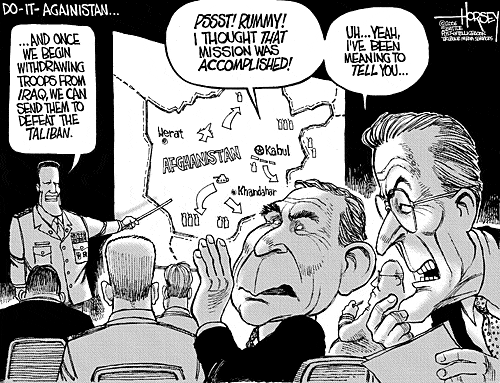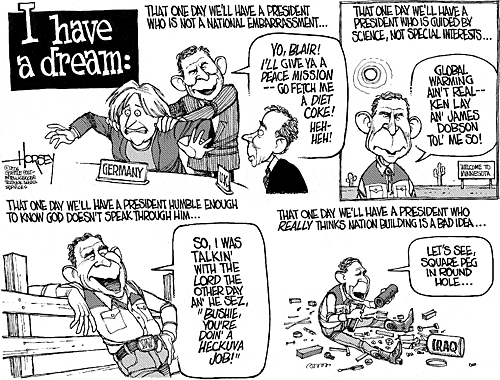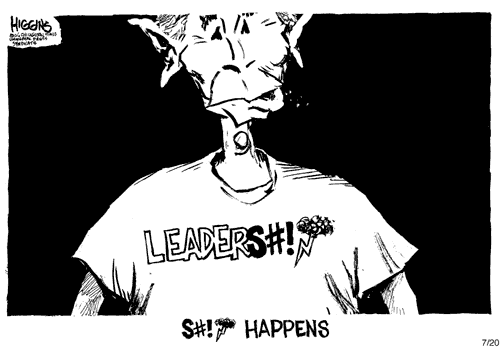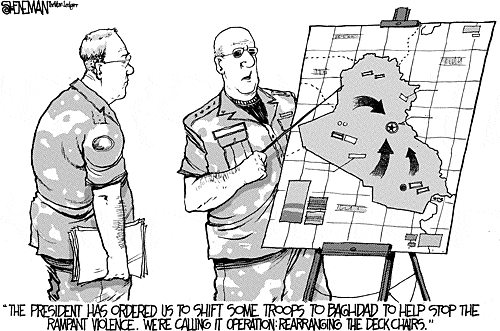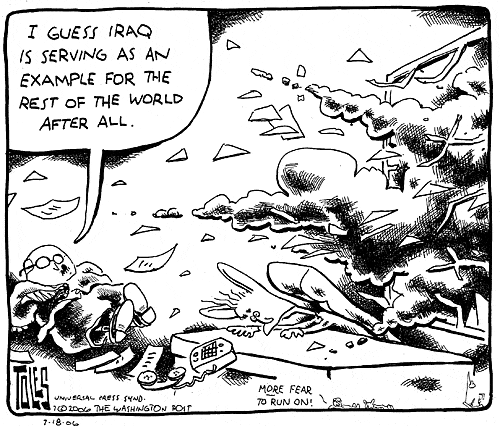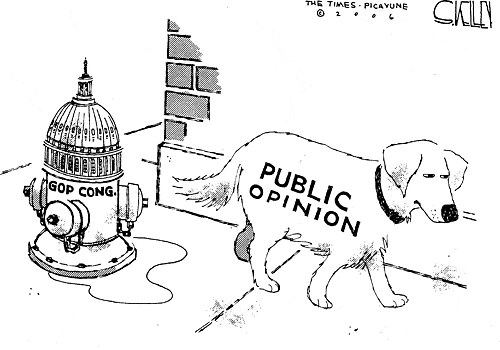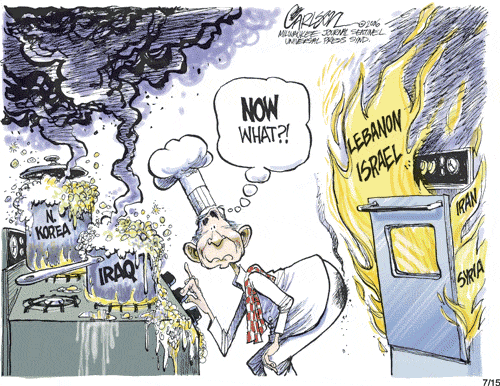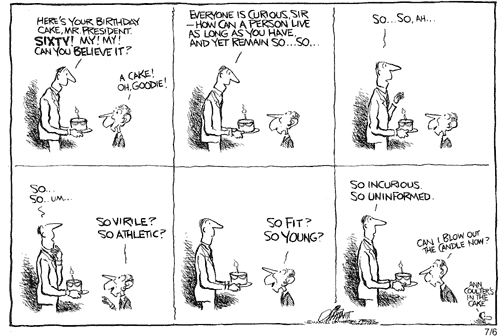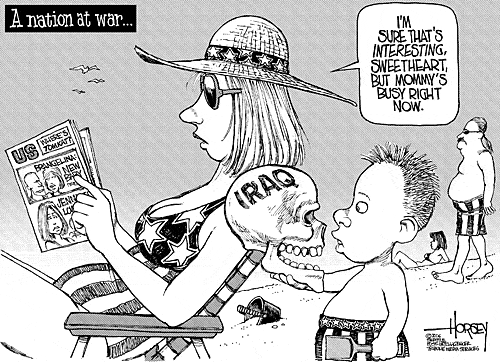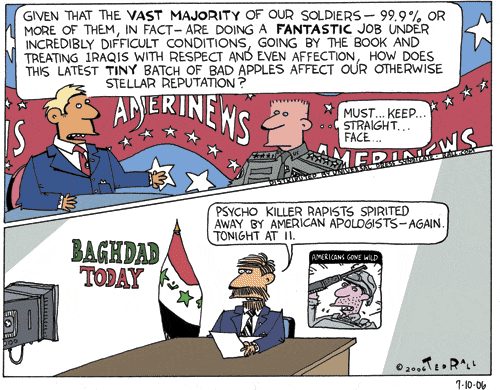Who Needs Congress or Courts With Bush?: Ann Woolner (Correct)
2006-07-28 09:11 (New York)
(Corrects name of Miami University in fifth paragraph.)
Commentary by Ann Woolner
July 28 (Bloomberg) -- Congress passes a law that says the
U.S. won't torture people. The president says OK, we won't --
unless we really need to, thus adopting an exception Congress
had specifically and vociferously rejected.
Congress passes the Sarbanes-Oxley law to reform business
practices. In signing it, the president issues a statement to
cut back on protection for corporate whistle-blowers.
Congress passes a law telling the administration to inform
it on specific matters. The president issues statements saying
he won't disclose anything he doesn't think he should.
So Congress tells him to notify it when he decides to
ignore a law. He repeats that he will disclose only what he
thinks he should, claiming, as he always does, constitutional
authority to resist.
As of July 11, President George W. Bush had said no (or,
not unless I want to) to 807 provisions enacted by Congress that
he signed into law, according to Christopher Kelley, a political
science professor at Miami University of Ohio.
That number compares to some 600 provisions challenged by
all of Bush's predecessors combined, says Kelley. He has been
studying presidential signing statements for a decade, and his
work is backed up by other scholars.
Now comes a bipartisan American Bar Association task force,
which concluded this week that presidential signing statements
such as Bush's are ``contrary to the rule of law and our
constitutional separation of powers.''
Equal Branches
The Congress writes the laws. The president executes them.
The courts decide whether they violate the Constitution. When a
president claims he can rewrite a law before executing it, he is
acting as all three branches.
``The original intent of the founders is that we have a
system in which power would check power,'' said task force
member Mickey Edwards, a former Republican House member and
founding chairman of the American Conservative Union.
``If a president believes that a statute or piece of a
statute is unconstitutional, it is his obligation to veto it,''
Edwards said at a news conference.
Congress then would have the chance to either sustain or
overturn his veto.
Bush isn't the first president to object to a bill while
signing it. That was James Monroe in 1821, according to Kelley.
Since then, presidents of both parties have done it. Jimmy
Carter bucked Congress when he pardoned Vietnam draft evaders,
for example.
Under the Radar
On that one, Congress sued Carter in a case thrown out of
court. But for the most part, no one paid much attention to
signing statements, as it has never been clear what force, if
any, they carry.
``Prior to this, presidents were operating under the
radar,'' says Kelley.
Bush took the practice into a whole new universe.
When he signed the anti-torture act on Dec. 30, for
example, he went on at length listing provisions he says would
be unconstitutional for him to obey. Same thing on
appropriations bills.
``The sheer number of Bush statements does suggest some
unwarranted exuberance,'' says Douglas Kmiec, a Pepperdine
University law professor.
Kmiec headed the Justice Department's Office of Legal
Counsel under Presidents Ronald Reagan and George H.W. Bush,
helping to shape signing statements.
He defends the current president's practices, for the most
part. They are, in the main, justifiable legally and hardly a
cause to ring the constitutional crisis alarm, he says.
Provocative Practice
The problem, Kmiec says, is the statements often are ``too
cryptic to be understood'' and therefore ``more likely to be
provocative'' than effective.
See if you can figure out when Bush will withhold
information Congress wants based on this excerpt, which shows up
in multiple signing statements:
He will inform Congress ``in a manner consistent with the
president's constitutional authority to withhold information
that could impair foreign relations, national security, the
deliberative processes of the executive, or the performance of
the executive's constitutional duties.''
It is true, of course, that Congress sometimes passes laws
that are unconstitutional. Presidents before Bush weighed
whether they should execute laws so faithfully that they violate
the Constitution, which trumps anything Congress enacts.
Disputing New Laws
Walter Dellinger, as head of the Office of Legal Counsel,
advised President Bill Clinton to dispute new laws only when
they were likely to be declared unconstitutional if the Supreme
Court were given a chance.
And yet, some of Bush's signing statements repeat positions
that the high court had already rejected, as in the area of
affirmative action.
Pennsylvania Republican Arlen Specter, chairman of the
Senate Judiciary Committee, has proposed a bill that would send
these sorts of disputes to the courts if at least one chamber of
Congress votes to do so.
But that bill faces political and legal hurdles. If it
becomes law, it probably wouldn't survive a court challenge,
says Kmiec.
Ah, but there are other ways for Congress to push back.
Lawmakers can hold hearings to expose wrongdoing. They can delay
presidential appointments, and they can tighten purse strings.
First, they would have to find the courage to buck the
president. Congress would have to finally, after all these
years, show that it is, indeed, a power separate from the White
House.
(Ann Woolner is a columnist for Bloomberg News. The
opinions expressed are her own.)
--Editor: Rubin (jto)
Story illustration: To read presidential signing statements from
the Hoover administration forward, click on
http://www.presidency.ucsb.edu/signingstatements.php.
To read the ABA task force report,
http://www.abanet.org/op/signingstatements.
To read today's top legal news, see {TLAW <GO>}. For a menu of
law-related links, see {BLAW <GO>}.
For other Woolner columns, {NI WOOLNER <GO>}. To comment on this
column, hit {LETT <GO>} and write a letter to the editor.
To contact the writer of this column:
Ann Woolner in Atlanta at (1)(404) 507-1314 or
awoolner@bloomberg.net.
To contact the editor responsible for this column:
James Greiff at (1)(212) 617-5801 or jgreiff@bloomberg.net.
[TAGINFO]
NI LAW
NI EXE
NI CNG
NI JUS
NI SUP
NI HIS
NI DC
NI PA
NI OH
NI WOOLNER
NI COLUMNISTS
NI COLUMNS
NI POL
NI GOV
NI GEN
NI TOP
#<698734.251583.2006-07-13T14:50:00.25>#
#<544449.4294967295.2006-06-20T17:50:00.96>#
#<610849.263818.2006-06-07T08:10:00.25>#
-0- Jul/28/2006 13:11 GMT
